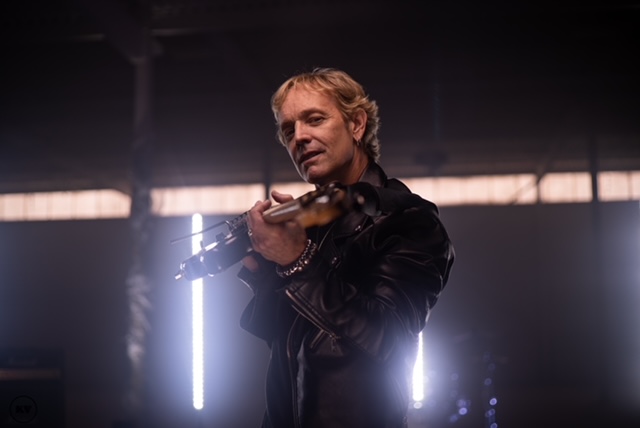Neil Osborne has witnessed many changes in the music landscape since the formation of 54-40. He has also seen many changes in himself over the years. In the beginning, Osborne was the angry young man on stage and record, railing against the machine and looking to change the world, but that stance has changed. “Well, I can only guess from my own perspective, but I used to be…younger, quite a bit,” offering a large smile. “There was more passion. I used to go on stage and prepare to die up there. That was my attitude. Whatever it took. Now, I have a lot of fun. I don’t take it too seriously.” He chuckles quietly as he relives a private moment.
Seriously or not, Osborne laments the lack of importance music holds for people these days. “Obviously, we still get worked up here and there, over certain issues…but I don’t think music is a significant culture, or issue that it was…or never will be again.” Obviously music is not the force that it once was and certainly not the engine of social change. “Well it used to piss me off sometimes when I’d make impassioned pleas for whatever it was. People would go, ‘You’re a music guy. It’s none of your business to get involved in that.’ Well, I can do what I want.” Which he continues to do.
Implying that music is now viewed as a cheap commodity that many people believe they don’t need to pay for, he doesn’t wish to be maudlin about this new world.
[youtube width=”600″ height=”450″ video_id=”fMZSSVt355I”]
“Well, be clear: there’s no reason to be depressed…I’m one of the lucky ones. I still got a gig. And these stations,” referring to the classic rock radio stations which play only the older hits of bands and shy away from the newer material, “—and there are a lot of them —they won’t play our new stuff, but they still play our old stuff. In fact, how do we feel about that? Let me tell you how I feel about that. When we released Lost in the City we hired a radio player, like you always do. And we said to him, knowing our past experience, ‘Just get them to play anything. Maybe making a deejay mention it, that’s enough.’ Or it used to be. We’d release a single and everybody’d play it.” After a long pause he adds, “I don’t know. It’s just the way it is.” As his voice trails off.
[quote]”I’m not the first to say this, but…you used to have to actually play the music. Now, you can get away with not playing it”[/quote]And in the age of social media with its intense interaction, where staying in touch with your fan base is absolutely critical, Osborne sounds quite casual, stepping back from the attitude that a band needs to aggressively communicate at all levels. “Hmm, it’s obvious that you have to connect a little bit.” He continues, “I don’t’ spend that much time on it to be quite honest. Brad [Merritt] handles all the business stuff. Dave [Genn] is kind of the new music director; he writes the sets. He does a lot of production in the studio. And Matt [Johnson] handles most of the social media stuff; sort of promo, profile…it’s a loose thing.”
The advent of social media came from huge changes in technology, which have also affected the technology of music and how artists write material and record. 54-40’s approach to songwriting has changed because they’re older and now live in different cities. They don’t often get together and jam, losing that creative time which can be so important for the development of new material. And with their livelihood dependent on their need to be performing, the time spent together deals more with the business of music than the actual creation of new music.
Regarding the new technologies available in the studio he states, “It’s really changed the way, you know, people make records. I’m not the first to say this, but…you used to have to actually play the music. Now, you can get away with not playing it,” which is certainly a comment on the lack of musicianship in many of the current stream of musical artists.
Deerfoot Casino, Calgary | January 12, 2013
Photography by: Charles Hope
And with the ability to fill a CD with over 65 minutes of music, Osborne pines philosophically, “Well, there are two sides to that. From an artistic side, an album is like a sentence; it’s a complete thought. It’s a group of songs that make up a complete scape, a soundscape. Or a psych-scape, as I like to call it, through music. I don’t know. Some fall by the wayside. You get this collection of material that if they don’t make the record, they don’t make any record. They represent where we’re at, at the time. Having said that, we like to keep it down to 10 songs these days. I find it hard that anybody would want to listen to more than 10 songs of anything.”
In the early years of 54-40, video played an important part in breaking the band, helping to get their music out to a larger audience. Though the power of music videos for promotion isn’t the same as it once was, the band continues to utilize the medium. For the title track of Lost in the City, the band produced a black and white video that featured a mime walking the streets of Vancouver. With awareness that odd or quirky videos released on YouTube can break artists, Osborne is honest about the role of video for 54-40, while noting the harsh reality of where they are in the grand scheme of things. “Certainly videos helped us back in the 90s. I still think that they’re kind of a neat thing to do, but it’s not—we’re selling horseshoes now. It’s the truth. Let’s get right down to it,” as he smacks the table with his open hand. “People have cars and we still sell horseshoes. It’s tough.”
But having said that, it can be noted that the band has stability and isn’t desperate for outside assistance like crowd funding. Though they haven’t openly discussed the suggestion for new projects Osborne is intrigued with the concept and has been aware of it since he produced and album for Cara Luft, who raised money for her album from intimate shows in people homes and other funded activities.
[quote]“You know you made it when you’re in a crossword puzzle.”[/quote]The conversation over fan supported activities moves into the mention of his daughter, Kandle, a musician living in Montreal who is working hard on her career, though he understands it is tough for her as well. “Somehow she can still draw a few folks, get enough money to record, travel to Europe, and do all that stuff. I don’t know how. I’m old school in terms of—I only know the old way you used to do things: you get the record company and they’d plug the radio.” And the old school approach of gigging and gigging and gigging with the hope that someone is buying the music. Osborne’s dry sense of humour comes to the fore, “Dave makes the joke—not that we’re sad—Dave goes, ‘It’s a great record, I can’t wait for it to come out.’” Referring to Lost in the City which was actually released in 2011.
54-40 is working on a new album. Though it’s in the early stages he promises some piano ballads a la REO Speedwagon, having toured with them in the US last summer. He notes that the songs were fun to write and are a bit of a departure for the band. As the discussion of the new album continues, he receives a message on his phone from Brad Merritt, the self-appointed archivist of the band who found yet another ‘you know you made it when…’ moment. The moment is a crossword puzzle hint with a line of text with a blank for a missing word; and the note ‘a 54-40 lyric.’ Osborne laughs, “You know you made it when you’re in a crossword puzzle.”
And 54-40 have made it though they’re not resting on their laurels and will continue writing catchy songs that deserve to be heard, both live on CD. They may be selling horseshoes, but those horseshoes are well-crafted pieces of exquisite art, made of pure gold.
To contact 54:40 go to www.5440.com















